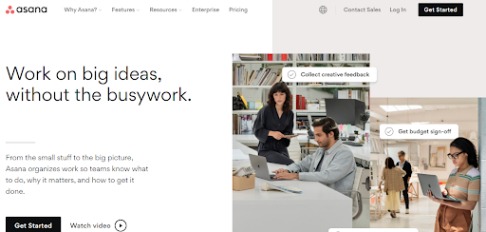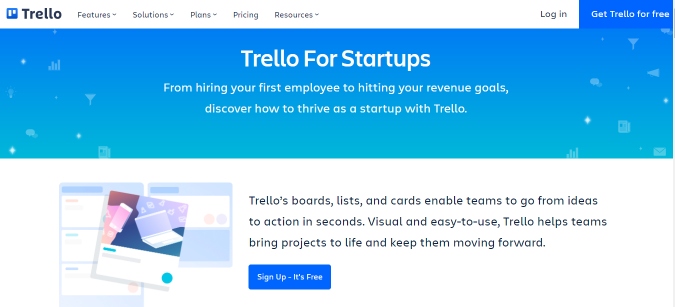Managing projects is no less than a daunting task. Multiple tasks, urgent resource requirements, approaching deadlines, and inaccurate task distribution seem to strike your project right when it’s least expected. And add to that the fact that you’re running a startup, and there tumbles the ‘undefeatable startup project management plan.’
We know it’s not easy. It’s messy and chaotic and all over the place.
But, guess what? It’s okay!
Handling a startup means dealing with fast-moving tasks that require the team to be flexible enough to adapt to evolving project requirements. It includes closely monitoring the critical path of project execution while also handling clients simultaneously.
So, without further ado, let’s get started and understand how you can simplify startup project management by leveraging a few proven tips coupled with a simple online project management software for consistent project success.
Read More: Top 16 Project Management Software for Small Businesses
Why Is Effective Project Management Important for Startups?
Not convinced why project management for startups is crucial?
Do you know that 9 out of 10 startups fail? Yes! That’s correct.
Sounds overwhelming? Well, project management for entrepreneurs, leaders, and project managers handling startups is full of daily challenges and constantly changing project requirements. Getting project management into the picture enables certain benefits that we will discuss below.
Let’s get into it.
1. Improved Workflow Efficiency
A project workflow is the foundation that sequentially holds all project activities. Good project management establishes a well-organized workflow that, in turn, establishes streamlined processes. Team members simply have to follow a planned path of project execution that is most likely to deliver results as expected. It also helps managers track whether project execution is going as planned. Also, it is the easiest way to track progress and stay on top of deadlines at any given point.
2. Minimized Risks
Every step you take in the direction of project completion must be regularly analyzed to check for potential risks. Various parameters must be assessed, and risks must be identified at the earliest. Spotting a risk early on better equips you to tackle them at a more manageable phase. So, while tasks may get delivered on time and expected results may be visible, be sure to evaluate every aspect, every key project metric of the project for continued smooth execution through each stage of the project.
3. Better Resource Management
A startup most often struggles with resource management issues. While a resource may abruptly run out, a team member might suddenly decide to go on a long leave. It’s essential to be prepared and take some buffer while determining project goals. For example, even if you think that you can deliver a project within ten days, it is a smart move to take a couple of days extra and define the project deadline two days ahead that you think is achievable.
Think about it. In such a case, if you fall short of a project resource, you still have two days to cover up. And if you manage to complete the project well within ten days, then viola! You just accomplished a project well before the defined time. That’s sure to earn you brownie points from your client!
Also, while allocating resources and deciding the project timeline, make sure that no resource is either overworked or underutilized. Optimize resource allocation throughout the project and prioritize tasks for each resource for better efficiency.
4. Enhanced Accountability & Productivity
Setting up a project workflow indicating which resource is accountable for which tasks brings transparency to how the project is run. It unifies planning, creating, and monitoring project processes leading to the best-case scenario for assured project success. Good project management promotes accountability within the organization, improving team productivity and performance at the same time.
5. Business Continuity
Any business that commences aims to scale to a larger business quickly. Well, there’s no harm in that, but the management chakras have to be aligned for that, right? This is why you need solid project management skills that ensure that you accomplish projects within the defined scope, budget, and timeline by controlling all three aspects at every stage of the project. This not only ensures project success but allows your organization to scale efficiently and at ease.
Thus, you see that these are advantages that no entrepreneur, leader, or project manager can deny. It’s also important to pay attention to other details, such as choosing a suitable web host to support your website. Enabling these will bring significant improvements in overall productivity, efficiency, and of course, the final project outcomes. Also, there are some project management methodologies that can help you with handling startup projects in a structured manner. Let’s look at these.
Read More: 15 Essential Project Management Tips for a Successful Project
Project Management Methodologies for Startups
Project management for startups becomes easier when supported with a reliable project management methodology. A methodology indicates the best project management strategy for project execution right from its initiation to its closure.
Here are the 4 best project management methodologies for startups. Take a look at them to analyze which one will compliment your project needs and pace.
1. Scrum
Scrum is a project management methodology wherein projects are divided into tasks and completed in short intervals. Each short interval is known as a sprint. There is a Scrum Master who controls these sprints. Also, client feedback is collected after each sprint. Here, emphasis is given to daily communication, and tasks are prioritized and delivered on a daily basis.
Why does the Scrum methodology suit startup project management?
Startups often struggle with completing projects on time while delivering the quality as expected. Adopting the Scrum methodology will enable startups to plan their project in short sprints. This way, team members can approach a specific set of tasks with greater confidence as tasks are discussed daily, and work is optimized on a regular basis to better cater to client demands.
2. Kanban
Kanban is a project management framework that enables you to plan and manage project tasks and activities using a visual Kanban board. Here, the project manager is responsible for monitoring the project. Also, timelines are not fixed here, and changes are incorporated as they come in. Using a Kanban board, you can visualize every aspect of a task, such as task assignees, due dates, file attachments, and task briefs.
Why does the Kanban methodology suit startup project management?
Kanban is great for managing projects for a startup. It lets you set up the entire project schedule on a Kanban board. Using it, you can monitor which tasks are at which stage of project execution at a glance. It helps gain a clear understanding of which tasks are in progress, completed, being reviewed, or on hold. Also, the Kanban technique lets you adapt to changing requirements and address feedback easily.
Read More: Kanban Project Management Everything you Need to Know
3. Waterfall
Waterfall Project Management refers to a sequential method of project management. This means that each project is split up into phases consisting of a set of tasks. You can only proceed to the next phases once you are completely done with the previous phase. This methodology relies heavily on careful planning and to-the-point execution.
Why does the Agile methodology suit startup project management?
This methodology is excellent if your startup deals with clear-cut project requirements right from the beginning. This will be possible if you attain accurate briefs from clients that are unlikely to change during any stage of the project. Using this methodology, you can get down to start your project and deliver tasks one by one in a pre-defined, sequential manner.
4. Critical Path Method
Critical path refers to the longest sequence of scheduled project tasks and activities that must be completed on time to impact the overall timely project completion positively. These tasks are mostly interdependent and require dedicated effort to be accomplished as desired.
Why does the Critical Path Method methodology suit startup project management?
Critical path method, also known as CPM, is awesome for startups that deal with complex projects. This technique lets you identify the most critical sequence of tasks. This ensures that your team recognizes the most crucial tasks, enabling a better chance of success. This is because the team is best prepared to execute these tasks from the start. Different methodologies may suit different types of startups. You must answer the following questions and determine which methodology is best for your unique project and team needs. Also, don’t forget that you can mix it up and even adopt different methodologies for different projects within your organization.
- How big is your team?
- Do you have sufficient resources to manage multiple projects simultaneously?
- Do you get well-defined project briefs from the client, or do requirements keep on evolving as per market trends?
- How often do your projects get feedback from clients?
- Do your team members need to collaborate too frequently?
Read More: Change management in project management
Startup Project Management Tips for Entrepreneurs
Here are some proven tips for entrepreneurs to incorporate into their project management practices for high-performing startup teams and projects.
1. Set Realistic Goals
Project management aims to fulfill a certain set of goals as an organization. Ensure that you set accurate and realistic goals. You may be tempted to overpower your previous set of goals by setting unrealistic and unattainable goals. However, understand that this will only prove to be a step in the direction of failure. Goals should be fair, specific, and in line with your project and organizational objectives.
2. Identify Risks at the Earliest
Look for potential problems while managing projects. Can you spot a potential issue? If yes, make sure that you address it right away and do not leave it to be entertained at a later stage. This is because, by the time you sit down to address the risk, it may have become too big to be handled by you and the team. So, keep analyzing the key project metrics and address risks at a manageable level.
3. Avoid Scope Creep
Projects tend to let in issues such as scope creep. This happens because you lack a proper system of getting client briefs. What this does is that it throws the set workflow off the window and brings in chaos and confusion. Scope creep is most often due to miscommunication and uncontrolled project requirements.
Simply put, wherein the set deliverables or objectives keep on changing during the project execution phase is a clear case of scope creep. To eliminate this, clearly define the project deliverables and outcomes in the beginning of its initiation.
4. Incorporate Change Management
There may be situations where you need to incorporate changes to adhere to set project output. This is where change management comes into the picture. Change management refers to a smooth transition of project activities and resources to integrate the changes required. For this, you and your team must be prepared to be agile and flexible, enabling smooth change management without causing stress at any point.
5. Adopt a Project Management Tool
You can simplify project management using a startup project management tool. A project management tool for startups is capable of handling teams and projects of all sizes and complexity. It helps streamline processes and provides a platform for team members to collaborate on. Using this tool, you can monitor work progress and implement the best practices for sure-shot project success.
A project management software for startups enables you to:
- Set up project schedules and workflows
- Customize workflows within seconds
- Visualize projects from anywhere and anytime
- Connect and collaborate with team members and stakeholders
- Share files on the go
- Extract KPIs to make well-informed decisions
6. Prioritize Projects & Tasks
Prioritizing projects and tasks assures that you get the most important or urgent tasks done first. This means that you get task anxiety related to important tasks off your mind and complete the rest of the tasks as per the defined schedule.
7. Optimize Resources Allocation
As a startup, your resources are undeniably the most important aspect of running a successful project. To optimize your resource allocation, it is essential that you analyze your resources’ current commitments. Are they overworked? Or underutilized? Determine each resource’s capabilities, bandwidth, and area of responsibility within the organization, and set up resources against tasks in an optimized manner.
8. Ease Team Collaboration
Projects cannot be executed with a disintegrated team. Establish a structure for seamless team communication. You can try conducting a few team-building activities that help break the ice and let team members know and get familiar with each other. Apart from this, provide the team members with a medium through which they can freely approach each other to connect, address, and resolve feedback instantly.
9. Estimate Accurate Budget & Timeline
Estimating the project budget and timeline is not an easy task. But, you can make the estimation better and almost as good as the actual expenditure by analyzing the budget and timeline of similar projects accomplished previously. Study carefully the numbers that you have set. Did you exceed the budget? Or were you able to complete the project well within the defined budget? Determine the worst-case scenario, compare the previous estimations for similar projects, and you will be able to arrive at the best estimation for both the budget and the timeline.
10. Automate As Much As You Can
Find some tasks that are too time-consuming? Or do you think that you have to work on a particular type of task again and again for different projects? Well, the good news is that such tasks can be set up for automation so that you do not have to waste time, effort, and resources on them ever again!
Taking automation a step further, many businesses and project management tools are now using AI agents to automatically track task progress, flag delays, and assist teams with routine project decisions without constant manual intervention.
How to Choose Best Project Management Software for Startups?
With a plethora of project management tools in the market, it can be overwhelming to choose one that will suit your startup needs.
But, don’t worry! We have listed the top criteria to consider while choosing a tool for your business.
Here we go!
1. Equipped With Core Management Features
To run a startup, you need to have some core features that enable a smooth project run. So, look out for a tool that offers task management, task prioritization, task dependencies, collaboration features, project alerts and notifications, project tracking, and much more. These are basic features that you need to run your startup without a hitch.
2. Long-Term Affordability
Looking at the pricing, you may feel like you can afford a tool for your business. However, it’s crucial that you analyze whether you can continue to afford the tool if you run into a loss in the future. It is in times like these that you actually need a tool, and if you fail to continue using the tool due to its unaffordability, then you might be setting yourself up for failure.
3. Easy-to-scale
When you start a business, you have the vision to scale it to new heights. For this, you need a flexible, versatile tool that scales with you. This means that a tool should be able to handle big and complex projects with ease. Also, often, tools fail to incorporate too many projects on their platform, making it difficult to scale projects and businesses. So, go for a tool that is capable of handling big, complex, and a large number of projects.
4. Adaptable to Change
Change management is part and parcel of running a project. Incorporating feedback, aligning projects to new trends, or rectifying the set strategy, all comes down to how well your project adapts to evolving needs. A good project management tool enables you to integrate changes while customizing workflows effortlessly.
5. Boosts Transparency
An ideal project management tool for startups lets you visualize how your projects are progressing. It displays which tasks are in progress and which are yet to be started. It also displays where your resources are engaged and whether you need to re-evaluate their allocation. Besides, such a tool also defines the due dates. All these aspects help boost transparency and give you the ability to analyze progress in real-time.
6. Offers Remote Access
Startups face situations wherein they are unable to hire manpower on time to complete a job. Having remote access gives the business the ability to hire people such as freelancers from anywhere in the world so that deadlines are not missed, and projects are delivered on time.
An upside to having remote access is also that your team members can work from home in case they do not feel good enough to travel to work on days that they are ill. This further ensures that you do not face manpower shortages and projects go on as scheduled.
Read More: 10 Task Management Tips for Higher Productivity
Top 8 Project Management Tool for Startups
Let’s take a look at the top 8 project management software that you can choose from for your startup.
1. ProProfs Project

ProProfs offers an all-in-one solution for all your startup project management needs. Its simple platform helps structure your everyday workflow to manage all the moving parts of your project seamlessly.
Using the tool, you can set up project workflows by creating tasks, assigning resources, and defining due dates. With a clear-cut project workflow in place, you can effectively track real-time progress and manage project deadlines. This, in turn, enables you to run projects smoothly from start to finish, leading to sure-shot business growth. Moreover, the tool lets you optimize resource allocation, saving time, effort, and money.
Also, the tool significantly impacts project execution, wherein you can simply prioritize a task or set up task dependencies within seconds. You can even set up recurring tasks for time-consuming or repetitive tasks. Besides, its multiple project views, such as Gantt charts, Kanban board, and Calendar view allow you to monitor tasks and projects the way you want.
Pricing:
Starts at $39.97/month.
2. Asana

Asana is a user-friendly platform that helps manage projects big and small. You can start your project from scratch or get started immediately using its ready-to-use project templates. This way, you can save time and get more work done in less time. Also, it offers List, Timeline, and Board view so that you can check project progress and deliver projects on time and within budget.
Pricing:
Basic – $0
Premium – $10.99/user/month
Business – $24.99/user/month
3. Trello

Trello is a Kanban-style project management tool for startups. So, if you like to gain increased visibility into tasks on a board, then this tool might fit the bill for you. The tool offers key insights into your project processes, helping you make informed, data-backed decisions for your business. It lets you direct your dedicated efforts toward high-level tasks by automating low-level tasks using its built-in automation.
Pricing:
Free – $0
Standard – $5/user/month
Premium – $10/user/month
Enterprise – $17.5/user/month
4. Teamwork
Teamwork is a collaborative project management platform that keeps your projects moving forward. You can set up milestones and track progress effectively. It enables teamwork by offering features like Messages and Integrated Team Chat to discuss ideas and Collaborative Document Editor to give and receive feedback instantly. Also, it stores all your project data so that you can easily access it anytime you want.
Pricing:
Free Forever – $0
Deliver – $10/user/month
Grow – $18/user/month
Scale – Get in touch with the company for a quote
5. Jira

Jira is an excellent project management tool that helps coordinate team efforts and scale-up projects easily. It is easy to set up and navigate. You can leverage the power of over 1500+ plug-and-play apps, bringing more functionality to your everyday processes. Its intuitive interface lets you track tasks and set up the task status, so that there is no discrepancy regarding which tasks are in progress and which are yet to be started.
Pricing:
Free – $0
Standard – $7.50/user/month
Premium – $14.50/user/month
Enterprise – Get in touch with the company for a quote
6. Basecamp

Basecamp is a feature-rich tool, great for remote teams and businesses. It provides a space that helps bring team members together to achieve shared business goals. You can use Message Boards and Group Chats to discuss ideas and projects. Also, you can create to-do lists to ensure that nothing slips through the cracks. Besides, its advanced client access helps keep clients in the loop and deliver projects as expected.
Pricing:
Basecamp Personal – $0
Basecamp Business – $99/month
7. Wrike

Wrike is a startup project management tool that helps plan, manage, and deliver projects using a single platform. You can establish project workflows and track them with ease. You can even customize these workflows within seconds to suit the project and team needs. Its resource management capabilities allow you to monitor resources with workload views and actionable project reports.
Pricing:
Free – $0
Professional – $9.80/user/month
Business – $24.80/user/month
Enterprise – Get in touch with the company for a quote
8. ProofHub

ProofHub is an all-in-one project management and team collaboration software that centralizes project planning, task management, and communication for teams of all sizes on one platform.
Gantt charts, Kanban board view, Discussion boards, built-in chat, time tracking, file management with version control, built-in proofing, and reports make it ideal for teams of any size, especially those looking to avoid per-user fees and the hassle of juggling different apps.
Pricing:
Essential Plan- $45/month billed annually
Ultimate Control Plan- $89/month billed annually
Scale Up Projects with Effective Project Management
Startup project management becomes easier once you have defined your organization’s purpose and set up a well-analyzed project execution plan in motion.
Ensure that you choose the right project management methodology for your projects. Remember, you can adopt different methodologies for different projects. Simply avoid a few common mistakes by following proven project management tips for startups as discussed above. Also, choose a startup project management tool that complements your work style and pace.
The right approach to managing everyday startup challenges will ease overall implementation and help you thrive in the rapidly evolving startup ecosystem.
FREE. All Features. FOREVER!
Try our Forever FREE account with all premium features!





